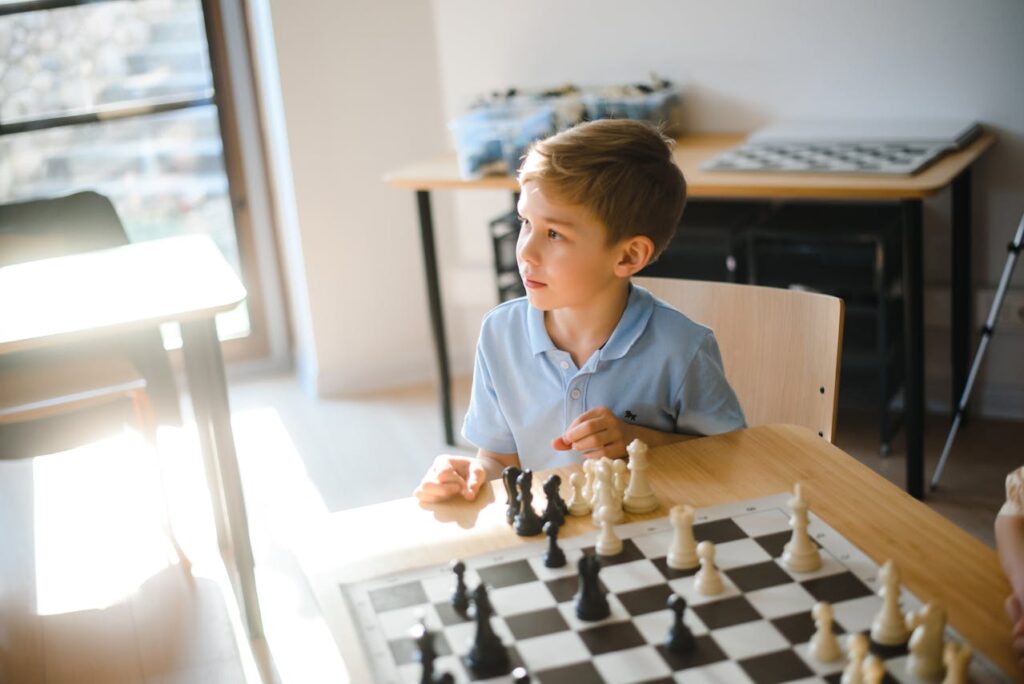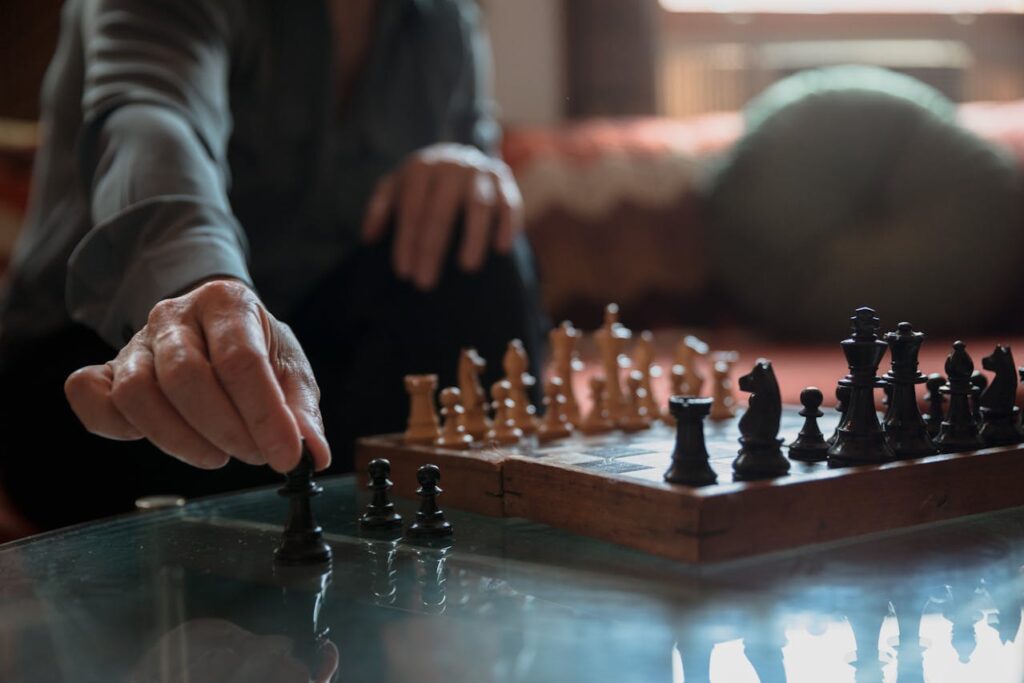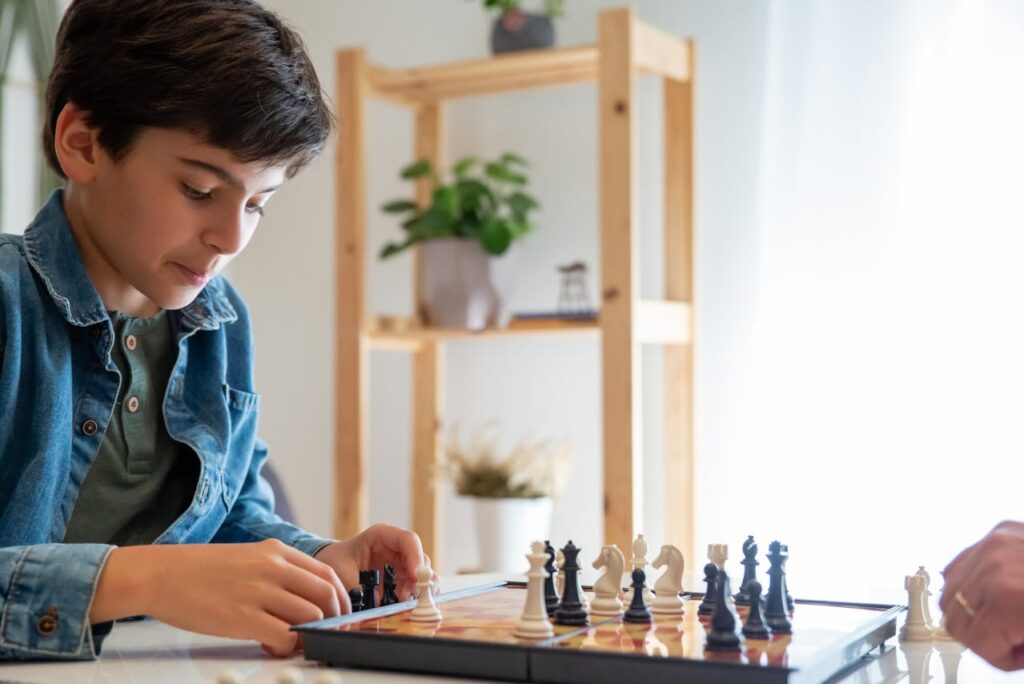Chess is more than just a game; it’s a journey of constant learning and self-improvement. For anyone involved in competitive chess, whether a young student or a seasoned player, the mental aspect is just as important as the physical act of moving pieces on the board. One of the key mental tools that can make or break a player’s chess career is their mindset.
How Competitive Chess Builds a Growth Mindset
Now that we understand the importance of a growth mindset in chess, let’s explore how competitive chess can help build and reinforce this mindset.
Learning from Losses
One of the first lessons competitive chess teaches is that losing is part of the game.
No one wins every time. In fact, even the greatest players experience losses. However, what sets successful players apart is how they respond to those losses.
In competitive chess, every loss is a valuable learning opportunity. After each game, it’s common to review your moves and analyze what went wrong.
This post-game analysis is crucial for building a growth mindset. Instead of seeing a loss as a failure, view it as a chance to learn something new.
Maybe you missed a crucial move, or perhaps your opening strategy needs work.
By identifying these areas, you can focus on improving them, turning a loss into a stepping stone for future success.
Embracing Challenges
In competitive chess, you’re constantly faced with challenges.
Whether it’s playing against a higher-rated opponent or tackling a difficult position, challenges are unavoidable.
However, these challenges are also what push you to improve.
When you have a growth mindset, you embrace these challenges instead of avoiding them. You understand that facing tougher opponents or difficult positions is the best way to grow as a player.
Each challenge you encounter forces you to think more deeply, study harder, and improve your skills.
Over time, this mindset of embracing challenges leads to significant improvement, both in your chess abilities and in other areas of life.

Persistence and Resilience
Persistence is a key component of a growth mindset, and competitive chess is an excellent way to develop this trait.
Chess matches can be long and mentally exhausting, requiring intense focus and concentration.
There will be times when you feel like giving up, especially after a series of losses or when faced with a particularly tough opponent.
However, it’s during these moments that persistence becomes most important.
Competitive chess teaches you to keep going, even when the going gets tough. It’s about not giving up after a few bad moves and staying focused until the very end of the game.
This resilience is not only crucial for success in chess but is also a valuable life skill.
The ability to persist in the face of difficulties, to keep trying even when things don’t go your way, is what ultimately leads to success.
Celebrating Effort Over Results
In competitive chess, it’s easy to get caught up in the results—winning or losing, increasing your rating, and so on. However, a growth mindset shifts the focus from results to effort.
It’s about recognizing and celebrating the hard work and dedication you put into improving your game, regardless of the outcome.
When you start to value effort over results, you’re more likely to keep pushing yourself, even when you’re not seeing immediate success.
This approach not only makes the process of learning chess more enjoyable but also leads to greater long-term improvement.
Over time, this mindset of celebrating effort becomes ingrained, helping you tackle challenges in all areas of life with the same determination and resilience.
Practical Strategies for Developing a Growth Mindset in Chess
Now that we’ve explored how competitive chess builds a growth mindset, let’s look at some practical strategies you can use to develop and maintain this mindset as you play.
Set Realistic Goals
One of the most effective ways to cultivate a growth mindset is by setting realistic and achievable goals.
In chess, this could mean aiming to learn a new opening strategy, solving a certain number of chess puzzles each day, or gradually increasing your rating over time.
Setting goals gives you something to work towards and helps you stay motivated. It’s important, however, to make sure your goals are realistic.
Setting overly ambitious goals can lead to frustration and disappointment if you don’t achieve them.
Start with small, manageable goals that are within your reach, and gradually increase the difficulty as you improve.
Focus on the Process, Not Just the Outcome
A key aspect of a growth mindset is focusing on the process of learning, rather than just the outcome.
In chess, this means paying attention to how you’re improving, what strategies you’re learning, and how your thinking is evolving over time.
Practice Regularly and Reflect
Like any skill, developing a growth mindset in chess requires regular practice. The more you play, the more opportunities you have to learn and improve.
However, it’s not just about playing more games—it’s also about reflecting on those games and learning from them.
After each game, take some time to review your moves and think about what you did well and what you could improve.
This reflection is crucial for building a growth mindset, as it helps you identify areas for improvement and reinforces the idea that mistakes are simply opportunities to learn.
Learn from Others
Another powerful way to develop a growth mindset is by learning from others.
Watch games played by stronger players, study their strategies, and try to understand their thinking process.
You can also discuss games with fellow players, ask for feedback, and learn from their experiences.
By learning from others, you expand your knowledge and gain new perspectives. It also reinforces the idea that there’s always something new to learn, no matter how experienced you are.
Overcoming Challenges with a Growth Mindset
Developing a growth mindset in competitive chess isn’t always easy.
There will be challenges along the way—moments when you feel stuck, frustrated, or even tempted to quit. But it’s precisely in these moments that a growth mindset becomes most valuable.
Handling Defeats and Setbacks
In competitive chess, defeats are inevitable. Even the best players in the world lose games. However, how you handle these defeats is what truly matters.
A fixed mindset might lead you to believe that losing means you’re not good enough or that you lack the talent to succeed.
This kind of thinking can be discouraging and may even cause you to give up on improving.
In contrast, a growth mindset helps you see defeats as part of the learning process. Instead of viewing a loss as a reflection of your abilities, you see it as an opportunity to identify your weaknesses and work on them.
For example, if you lose a game because you miscalculated a complex position, you can study similar positions to avoid making the same mistake in the future.
Every setback becomes a stepping stone, helping you inch closer to your goals.
Dealing with Plateaus
Another common challenge in chess is hitting a plateau—those frustrating periods when you feel like you’re not improving, no matter how hard you try.
Plateaus can be discouraging and may lead you to question your abilities.
With a growth mindset, you understand that plateaus are a natural part of the learning process.
They don’t mean that you’re stuck; rather, they indicate that you might need to try a new approach or focus on different aspects of your game.
For example, if you’ve been focusing heavily on opening theory but feel stuck, it might be time to shift your attention to middle-game tactics or endgame strategies.

Managing Pressure and Expectations
Competitive chess can come with a lot of pressure, especially when you’re playing in tournaments or trying to achieve a specific rating.
This pressure can sometimes lead to anxiety, which can affect your performance.
A growth mindset helps you manage this pressure by shifting your focus from the outcome to the process. Instead of worrying about winning or losing, you focus on playing your best and learning from the experience.
This mindset reduces anxiety and allows you to play more freely and creatively.
Additionally, a growth mindset helps you manage expectations—both your own and those of others.
It’s easy to get caught up in wanting to meet certain milestones, but a growth mindset reminds you that progress is not always linear.
Some games will be better than others, and that’s okay. What’s important is that you continue to learn and grow with each experience.
Staying Motivated Over the Long Term
Chess is a lifelong journey, and maintaining motivation over the long term can be challenging.
It’s easy to stay motivated when you’re winning and seeing progress, but what about when the results aren’t coming as quickly as you’d like?
A growth mindset helps you stay motivated by focusing on the intrinsic rewards of learning and improving.
When you enjoy the process of studying chess, analyzing games, and discovering new strategies, the motivation to keep going comes naturally.
Even when progress seems slow, you can take pride in the effort you’re putting in and the knowledge that every bit of practice is helping you improve.
Moreover, a growth mindset encourages setting long-term goals. These goals give you something to work towards and help you stay motivated, even during difficult times.
Whether it’s achieving a particular rating, mastering a specific opening, or simply becoming a more well-rounded player, having clear goals keeps you focused and driven.
Building a Growth Mindset Beyond Chess
The benefits of a growth mindset extend far beyond the chessboard.
The same principles that help you succeed in chess—embracing challenges, learning from mistakes, and valuing effort over results—can be applied to many other areas of life.
Academic Success
In academics, just like in chess, you’ll face challenges and setbacks.
Whether it’s a difficult math problem, a challenging science concept, or a paper that didn’t get the grade you hoped for, a growth mindset will help you navigate these obstacles with resilience.
Instead of giving up when you encounter difficulty, you’ll be more likely to seek out additional resources, ask questions, and put in the extra effort needed to succeed.
For example, if you’re struggling with a particular subject, a growth mindset encourages you to view it as a temporary challenge that can be overcome with persistence and hard work.
You might seek out additional practice problems, attend extra help sessions, or find new ways to study the material.
Just as in chess, where you might study more when faced with a tough opponent, you’ll apply the same approach to your academic work.
Career Development
A growth mindset is also invaluable in your career. Whether you’re just starting out or are well into your professional journey, the ability to learn from feedback, adapt to new situations, and continually seek improvement is key to long-term success.
In a professional setting, you’ll encounter challenges such as learning new skills, adapting to changes in the industry, or handling criticism from supervisors.
A growth mindset helps you approach these challenges with a positive attitude, viewing them as opportunities to grow and improve.
For instance, if you receive constructive criticism at work, instead of feeling discouraged, you might see it as a chance to refine your skills and become better at your job.
Moreover, a growth mindset fosters a love for lifelong learning. In today’s rapidly changing world, the ability to continuously learn and adapt is crucial.
Whether you’re learning new technologies, developing leadership skills, or exploring new career paths, a growth mindset will keep you open to new possibilities and ready to take on whatever comes your way.
Personal Relationships
Even in personal relationships, a growth mindset plays an important role. Relationships, like any other area of life, come with their own set of challenges.
Misunderstandings, disagreements, and differences in perspective are all part of the process.
A growth mindset helps you navigate these challenges by encouraging open communication, empathy, and the belief that relationships can improve over time with effort and understanding.
For example, if you have a disagreement with a friend or family member, a growth mindset encourages you to see it as an opportunity to better understand each other’s perspectives and strengthen the relationship.
By applying the principles of a growth mindset—such as listening, learning from mistakes, and being open to change—you can build stronger, more resilient relationships with the people around you.
How Global School of Chess Supports a Growth Mindset
At Global School of Chess, we’re committed to helping players of all levels develop a growth mindset through chess.
Our programs are designed to not only teach the strategies and techniques of the game but also to foster the mental attitudes that lead to success both in chess and in life.
Personalized Instruction
We understand that every player is unique, with their own strengths, weaknesses, and learning styles.
That’s why our instruction is personalized to meet the individual needs of each student.
Whether you’re a beginner or an advanced player, our experienced coaches will work with you to develop a plan that helps you improve and reach your goals.
Our approach emphasizes the importance of learning from every game, analyzing mistakes, and setting realistic goals for improvement.
We encourage our students to embrace challenges, persist through difficulties, and celebrate their progress along the way.

A Supportive Community
Learning chess is not just about individual effort—it’s also about being part of a community that supports and motivates you.
At Global School of Chess, we foster a positive and encouraging environment where students can connect with fellow players, share experiences, and learn from each other.
Our online platform offers opportunities for students to participate in group lessons, discussions, and tournaments, all within a supportive community.
This sense of belonging helps students stay motivated and reinforces the growth mindset principles we teach.
Continuous Learning and Improvement
We believe that learning is a lifelong journey, and we’re here to support our students every step of the way.
Our programs are designed to provide continuous opportunities for growth, whether it’s through advanced lessons, specialized workshops, or participation in competitive tournaments.
By encouraging our students to continuously seek improvement and embrace the challenges they face, we help them develop a growth mindset that will serve them well both on and off the chessboard.
Conclusion
Competitive chess is more than just a game; it’s a powerful tool for personal development.
By fostering a growth mindset, chess teaches you to embrace challenges, learn from mistakes, and persist in the face of setbacks.
These are not just valuable chess skills—they’re life skills that will help you succeed in whatever you choose to pursue.
At Global School of Chess, we’re dedicated to helping you build these skills through personalized instruction, a supportive community, and continuous opportunities for growth.
Whether you’re new to chess or an experienced player, developing a growth mindset will not only make you a better chess player but will also equip you with the attitudes and habits needed to thrive in all areas of life.
So, the next time you sit down at the chessboard, remember that every move is a chance to learn, every mistake is an opportunity to improve, and every game is a step forward on your journey to success.

